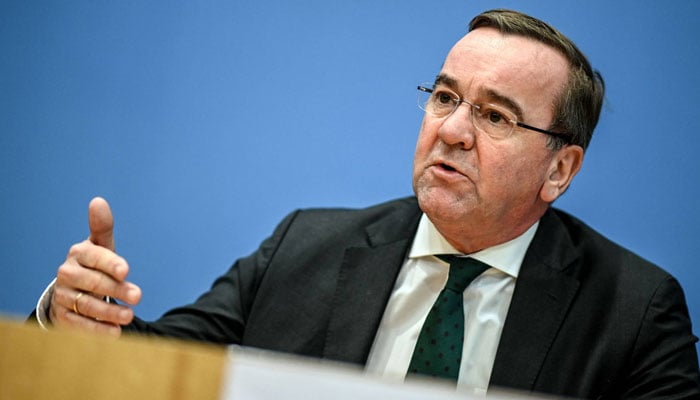Germany says one participant’s error led to Moscow intercepting call on Ukraine
Pistorius said Russia had leaked the call in a bid to create divisions in Germany and between the country and its allies
BERLIN: Germany’s Defence Minister Boris Pistorius said on Tuesday one participant on a high-level military call on Ukraine intercepted by Russia had mistakenly joined via a non-secure line and German communications systems had not been compromised.
Russia had likely intercepted the discussion among senior German air force officials by chance via widespread surveillance, Pistorius added, as he presented initial results of an investigation into the leak, which has embarrassed Germany and prompted questions about its intelligence security.
Russian media last week published an audio recording of a meeting of the German officials held on the Webex platform discussing the delivery of weapons for Ukraine and a potential strike by Kyiv on a bridge in Crimea.
“Our communication systems have not been compromised,” Pistorius said. “The reason the air force call could nonetheless be recorded was because of an individual’s operational mistake.”
The participant had dialed in from Singapore where an air show was taking place. Such an event attracted high-ranking European military officials, making it a target for Russian security services.
“So we must assume that the access to this Webex conference was a chance hit in the framework of a broad, scattered approach.”
The use of Webex for calls up to a certain security grade was authorized, he said, noting it was not the off-the-shelf software but a specially-certified one with servers in the Bundeswehr’s computing centres in Germany.
Still, Germany was investigating if issues were mentioned on the call that should not have been discussed on Webex, he said.
Pistorius said Russia had leaked the call in a bid to create divisions in Germany and between the country and its allies.
In the call, German Air Force Chief Ingo Gerhartz discusses with three high-ranking Luftwaffe officials the possible delivery of Taurus cruise missiles to Kyiv, which Chancellor Olaf Scholz has publicly so far firmly rejected, fueling a public debate.
Asked if the leak could affect the position of Gerhartz, who was not the one to dial in from Singapore, Pistorius said if nothing further emerged in the probe, “then I am not going to sacrifice one of my best officers to (Russian President Vladimir) Putin’s games”.
Germany would take technical and organizational measures to ensure such an incident would not happen again, Pistorius said, adding he had spoken on Monday with his peers in partner countries who expressed their continued trust in Germany.
“Everyone knows about the danger of such eavesdropping attacks and know that you cannot ensure 100 percent protection against them,” he said.
Germany’s allies have been reticent in their public reaction to the recording although some British politicians outside government criticised German security measures.
Former British Defence Secretary Ben Wallace was quoted as saying by The Times that the incident demonstrated Germany was “neither secure nor reliable”.
-
 Nicole Kidman Celebrates Galentine’s Day Months After Keith Urban Split
Nicole Kidman Celebrates Galentine’s Day Months After Keith Urban Split -
 Justin Bieber Unveils Hailey Bieber As First Face Of SKYLRK In Intimate Campaign Debut
Justin Bieber Unveils Hailey Bieber As First Face Of SKYLRK In Intimate Campaign Debut -
 Caitlin O’Connor Says Fiance Joe Manganiello Has Changed Valentine’s Day For Her
Caitlin O’Connor Says Fiance Joe Manganiello Has Changed Valentine’s Day For Her -
 Rachel Zoe Sends Out Message For Womne With Her Post-divorce Diamond Ring
Rachel Zoe Sends Out Message For Womne With Her Post-divorce Diamond Ring -
 James Van Der Beek's Final Conversation With Director Roger Avary Laid Bare: 'We Cried'
James Van Der Beek's Final Conversation With Director Roger Avary Laid Bare: 'We Cried' -
 Jaden Smith Walks Out Of Interview After Kanye West Question At Film Premiere
Jaden Smith Walks Out Of Interview After Kanye West Question At Film Premiere -
 Why Halle Berry Wasn't Ready For Marriage After Van Hunt Popped Question? Source
Why Halle Berry Wasn't Ready For Marriage After Van Hunt Popped Question? Source -
 Michelle Obama Gets Candid About Spontaneous Decision At Piercings Tattoo
Michelle Obama Gets Candid About Spontaneous Decision At Piercings Tattoo -
 Bunnie Xo Shares Raw Confession After Year-long IVF Struggle
Bunnie Xo Shares Raw Confession After Year-long IVF Struggle -
 Brooks Nader Reveals Why She Quit Fillers After Years
Brooks Nader Reveals Why She Quit Fillers After Years -
 Travis Kelce Plays Key Role In Taylor Swift's 'Opalite' Remix
Travis Kelce Plays Key Role In Taylor Swift's 'Opalite' Remix -
 How Jennifer Aniston's 57th Birthday Went With Boyfriend Jim Curtis
How Jennifer Aniston's 57th Birthday Went With Boyfriend Jim Curtis -
 JoJo Siwa Shares Inspiring Words With Young Changemakers
JoJo Siwa Shares Inspiring Words With Young Changemakers -
 James Van Der Beek Loved Ones Breaks Silence After Fundraiser Hits $2.2M
James Van Der Beek Loved Ones Breaks Silence After Fundraiser Hits $2.2M -
 Disney’s $336m 'Snow White' Remake Ends With $170m Box Office Loss: Report
Disney’s $336m 'Snow White' Remake Ends With $170m Box Office Loss: Report -
 Travis Kelce's Mom Donna Kelce Breaks Silence On His Retirement Plans
Travis Kelce's Mom Donna Kelce Breaks Silence On His Retirement Plans




